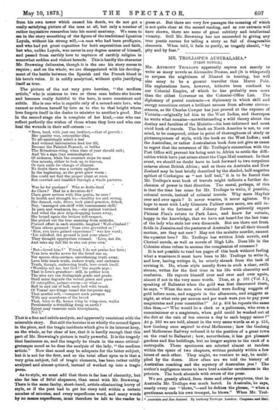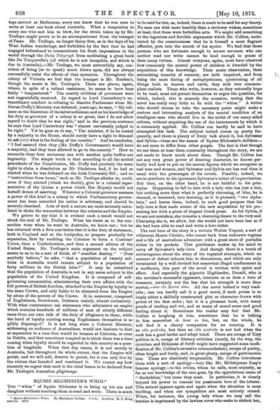MR. TROLLOPE'S AUSTRALASIA.* [FLBST NOTICE.] MR. TROLLOPE'S AUSTRALASIA.* [FLBST NOTICE.]
MR. ANTHONY TROLLOPE apparently aspires not merely to write as many novels as Alexandre Dumas, and (it is whispered) to surpass the mightiness of Nimrod in hunting, but will also essay to be a greater traveller than Marco Polo. His explorations have, however, hitherto been confined to our Colonial Empire, of • which he has probably seen more than the oldest Governor on the Colonial-Office List. The diplomacy of postal contracts—a diplomacy in which skill and energy sometimes extort a brilliant success from adverse circum- stances, as Sir Charles Cowper has just proved at the expense of Victoria—originally led him to the West Indies, and thereupon he wrote what remains—notwithstanding a wild theory about the destiny and faculties of the Mulatto—his best-informed and most vivid book of travels. The book on North America is not, to our mind, to be compared, either in point of thoroughness of study or picturesqueness of style, with the book on the West Indies ; and the Australian, or rather Australasian book does not give us cease to regret that the severance of Mr. Trollope's connection with the Post Office will prevent his being sent to Africa to settle the diffi- culties which have just arisen about the Cape Mail contract. In that event, we should no doubt have to look forward to two corpulent octavos about British Africa ; and as those on Australia and New Zealand may be best briefly described by the shaded, half-negative epithet of Cockaigne as "not half bad," it is to be feared that Mr. Trollope's next book of travels might indicate a further de- clension of power in that direction. The moral, perhaps, of this is that the time has come for Mr. Trollope to write, if possible, colonial novels, instead of colonial travels. Why mere Mayfair over and over again ? It never wearies, it never agitates. We hope to meet with Lady Glenc.ora Palliser once more, are still in- terested in the fortunes of Johnny Eames, patiently expect Phineas Finn's return to Park Lane, and know for certain, happy in the knowledge, that we have not heard for the last time of the lady who stole her own diamonds. But are there not fresh fields in Jamaica and the pastures of Australia ? for all their tinned mutton, are they not new ? May not the mulatto murder, cannot the squatter love ? Mr. Trollope has written Irish novels, and Clerical novels, as well as novels of High Life. Does life in the Colonies alone refuse to assume the complexion of romance ?
It is not possible to read ten pages of this book without feeling
what a weariness it must have been to Mr. Trollope to write it, and how, having written it, he utterly shrank from the task of revising it. He, whose style usually flows in such a clear, swift stream, writes for the first time in his life with obscurity and confusion. He repeats himself over and over and over again, almost if not in the very same words. Thus, at p. 381 (Vol. L), speaking of Ballaarat when the gold was first discovered there, he says, "When the men who watched were finding nuggets of gold before noon, and nuggets in the afternoon, and nuggets at night, at what rate per annum and per week were you to pay your magistrates and your constables?" At p. 404 he repeats the same idea thus,—" Who would be a clerk or a policeman, who even a commissioner or a magistrate, when gold could be washed out of the dirt at the rate of ten ounces a day to each happy miner ?" At p. 383 we are told, almost in the very same words as at p. 416, how Geelong once aspired to rival Melbourne ; ' how the Geelong and Melbourne Railway reduced it to the position of a great town on the road to Ballaarat ; how, nevertheless, it has got pleasant gardens and fine buildings, but no longer aspires to the rank of a metropolis. These specimens are selected almost at random within the space of two chapters, written probably within a few hours of each other. They might, we venture to say, be multi- plied by the dozen. How often are we told the history of Australian coaching and the mystery of Australian jam ? The author's negligence seems to have bred a similar carelessness in the printers. The book abounds with errors of the press.
We are greatly afraid, from these and other symptoms, that in Australia Mr. Trollope was much bored. In Australia, he says, nearly every one "blows,"—and he defines the phrase, "when a gentleman sounds his own trumpet, he blows." When Mr. Trol-
* Australia and New Zealand, By Anthony Trollops. London: Chapman sad Hall. lope arrived at Melbourne, every one knew that he was sure to write at least one book about Australia. What a temptation to every one who met him to blow, for the strain taken up by Mr. Trollope might prove to be an accompaniment from the trumpet of Fame. Mr. Trollope, no longer fancy-free, as in the days of his West Indian wanderings, and forbidden by the fact that he had engaged beforehand to communicate his fresh impressions to the world through the Daily Telegraph from meditating a great book like De Tocqueville's (of which he is not incapable, and which is due to Australia),--Mr. Trollope, we must sorrowfully say, con- scious of being (so to speak) much blown upon, did not always successfully resist the effects of that operation. Throughout the colony of Victoria we feel that the trumpet is Mr. Rusden's, though the music is Mr. Trollope's. There are places, again, where, in spite of a valiant resistance, he seems to have been fairly " besquattered." The courtly civilities of governors were not ungratefully received. In regard to Lord Canterbury's ex- traordinary conduct in refusing to dissolve Parliament when Mr. Gavan Duffy's Ministry was defeated, years ago, he says, " My reli- ance on the discretion of the latter nobleman and on his knowledge of his duty as governor of a colony is so great, that I do not allow myself to doubt that be was right," and in the previous sentence he says that Lord Canterbury was "almost universally judged to be right." Yet he goes on to say, "The minister, if he be ousted by a majority in the House, should surely have a right to demand to ask (sic) what is the feeling of the country." And he concludes, "I feel assured that they (Mr. Duffy's Government) would have a majority, had they been allowed to go to the country." How to reconcile these four sentences one with another quite baffles our ingenuity. The simple truth is that according to all the settled precedents of the Constitution, Mr. Duffy had precisely the same right to claim a dissolution as Mr. Gladstone had, if he had so elected when he was defeated on the Irish University Bill ; and no "instructions from home," such as Mr. Trollope alludes to, could, even if they existed (which we doubt), give to a colonial repre- sentative of the Queen a power which Her Majesty would not herself dream of asserting. Wherever a Colonial governor assumes a power of this kind in a colony to which Parliamentary govern- ment has been conceded his action is arbitrary, and should be severely chastised. Acts of such a nature are most seriously calcu- lated to shake the connection between the colonies and the Empire.
We grieve to say that it is evident such a result would not shock the soul of Mr. Trollope. What his views as to the con- nection were when he went to Australia, we know not ; but he has returned with a firm conviction that it is the duty of statesmen, both in England and at the Antipodes, to prepare gradually for separation, first by enabling the Colonies to form a Customs' Union, then a Confederation, and then a second edition of the United States. Mr. Trollope's main argument on the subject seems to us to be a sort of fetish of "manifest destiny." "Does anybody believe," he asks, "that a population of twenty mil- lions in Australia would remain subject to a population of forty millions in the British Isles ?" It may be submitted that the population of Australia is not in any sense subject to the population of the United Kingdom. It is composed of self- governing communities, administering their own affairs with the full powers of British freedom, attached to the Empire by loyalty to the same Crown, and only liable to be alienated from the Empire by abuse of the powers of the Crown. It is, moreover, composed of Englishmen, Scotchmen, Irishmen mainly, almost exclusively. With what countenance can statesmen who administer an empire which contains hundreds of millions of men of utterly different races from our own talk of the duty of allegiance to them, while the bond of loyalty existing among Englishmen themselves is so glibly disparaged ? It is not long since a Colonial Minister, addressing an audience of Australians, would not hesitate to hint at separation in a tone that would be treason at Calcutta, or even in Dublin, and that sometimes tempted us to think there was a time
coming when loyalty should be regarded in this country as a ques- tion of longitude. When that day comes, it is not merely in Australia, but throughout its whole extent, that the Empire will perish, and we will add, deserve to perish, for it can only live by the virtues that founded and combined it. We cannot say how sincerely we regret that such is the chief lesson to be deduced from Mr. Trollope's Australian pilgrimage.



































 Previous page
Previous page